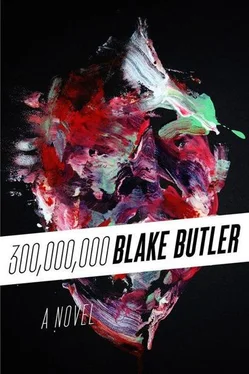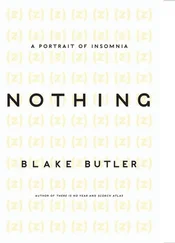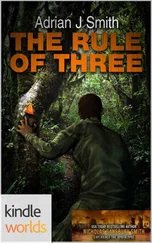Teeth, hair, jowls, blood: packets, mush.
One can, in the fiber of the room, hear a tone of what has been.
Bones jut from the substance crushed in the lardy stillwaves of our pink and black and brown and yellow and gray and gold and white.
Seated among the encasement, as upon thrones in silence, lie certain still living, pulsing boys, starved and demolished, thinning, nothing: their eyes also refusing to come open, give no murmur.
A scrim of salt.
On the ceiling above the heads of the detectives, the ceiling reads: THIS BODY LED ME TO SHIT INSIDE MY LIFE BLANK AND SCREAMLESSLY UNENDING WHILE THE WAR OF THE YEAR OF TOTAL DEATH CREAMED BETWEEN OUR FACES AGAINST THE FURTHEREST WALL THE WALLS COULD MANAGE AND THERE YOU WERE AND THERE I AM ENDLESSLY GYRATING IN THE EYELESS FORCE FIELD OF OUR FUTURE LOVE AS WE ARRIVE. None of the detectives see or note the sentence, for the record.
The living boys are lifted each away. They make no sound, cause no commotion.
The other bodies, who could ever move them now.
FLOOD: The smell was — I hate to say it — sweet. It reminded me of waking up in a grassfield having slept all through the night without coverage against the night sky. I mean, I don’t want to sound morbid, it was revolting. The sweetness was revolting. But it was also — I breathed it in .
The men lead the body of the man who will not respond to any name along the long precinct hall intoned pale white. The facility is quiet and dully lit in the mode of lampshade blocking out a stream of air that seems to stand outside the building.
Long textured lattices of ridge set in the precinct hall’s walls’ face in the same color of the wall allow a running joke among many of the guards that the building is “ribbed,” for the pleasure of something that passes through the unseen logic of the hour daily, or hourly, or is ever present, yet always gone. Regardless of the number of days that pass for any body inside the chamber most find the ridging something they can never learn to disregard, the eye always pulling up inside the skull to see it.
The body, though, whom they refer to in the name of Gravey, as it fits the ridges set into his fingers on his hands, does not seem to see, acknowledge, or want to know any inch about the ridging, or the hallway, or the building of the walls themselves. He walks in silence, still with closed eyes and closed mouth; when not led by the shoulders forward through the building or wherever Gravey ceases to proceed, and yet he does not fight in being pulled along the corridors through check-ins, through registration. No form of coercion leads the man to act alone, including body shots and threats of further marks against his name.
A strip search of the suspect’s body reveals a diamond hung by black cord around his waist. The diamond is false diamond; it obscures the eyehole of his belly button, around which the hair has been removed. The remainder of pubic hair around the genitals has been shaved into a pattern like the beams of an aggravated sun. The shaft and glans of the unit are bruised, blood busted beneath the skin in thicket clouds.
A gun strap around the sternum holds no weapon; tucked into the holster is a tiny leather-surfaced notebook, water-damaged with his sweat. No language has been written into the unlined paper.
The anal cavity is overrun with brittle hair, so thick that they almost do not find the tiny transistor that has been stuffed into the crevice, matted in and clung with fecal residue. The transistor does not transmit.
Beneath the nail on the second longest toe of each foot a wedge of glitter has been lodged; on the face of the glitter occur words, none of which will be recognized, or read.
Water sprayed onto the body in the small stall comes off in foamy blue.
For some time in the hour he is made to lie on the cold floor naked without whimper, until the men are tired of looking at the raw colored markings on his chest and in his pits: like something there had scorched his flesh wide open and then resealed it, prim pockets of aggravated fat that stay so still.
Somewhere an old smoke rises.
B. LAPUZIA: When Flood asked me to take a look at his ongoing log about the case, handing me this outlandish collection of scattered notes, some of which he claimed to have found in Gravey’s residence, and which were not reported as evidence, I was seriously uneasy. For a while we had been partners, and though eventually I was reassigned, we’ve always been friends. He’s been through a lot, and I try to be there for him when I can. I told him I’m not much of a note taker, and didn’t really have anything to add in this manner, but that I’d take a look when I had time. I must admit, I was disturbed by his notes. They did not, to me, reflect a natural manner of investigation, or, even more so, a manner of living. Flood seemed fixated on his work in a way that went beyond it being work, even a life’s work. The more I tried to figure out what was going on with what he’d done, the more I wasn’t sure how to respond. I felt I had no choice but to mention it to the boss, though I can’t say the Sgt.’s tone in our private speaking set me at ease. He had the same quaver in his voice that Flood did, the same something slightly off. I myself haven’t felt right recently. I don’t know what it is, though for some reason I’m afraid to look in the mirror. I move through rooms with mirrors now, whenever possible, in the dark .
In his containment unit, Gravey’s body stands through the evening without fold. Aimed facing toward the entry door of his chamber, its form sealed in with one thick window’s eye into the public tunnel, he stands with arms flat at his side.
He does not bend to eat from the tray of dinner that is brought in and laid before him; the food will be fed instead into a disposing machine. He does not sit or lay or stand throughout the first night into the morning with the shifting of the guards. He does not open his small eyes in the crane of light beamed at his gray brain through his skull where the room around him remains lit. He does not utter language at the body assigned to his body as an attorney. He often does not seem to visibly breathe: no chest rises in the orange cloth, no nostril flutter, though to the touch his skin is warm in patches.
His temperature is three degrees too low.
Days pass in the standing. At intervals he barfs onto his chest; the upchuck is transparent. The hair stands on his arms; it grows further down his head and face, building a mask.
During his trance, the living bodies who were found there beneath his house each die, of what seems no particular occurrence, in their sleep. They are identified or not, buried or cremated, given to the ground to be absorbed into the earth again, where food grows and the foundation of all homes is laid. Other boys will soon come forward.
Pictures taken of Gravey’s body in his cell seem off-colored, tinted redder in the cheeks and down the arms. A glass of water placed beside him on a white stool stutters selectively in ripples on its circular contained face, briefly quaking in indexed repetition as if nudged by something silent, until again the air around the air is calm.
Urine is released and wets his institutional pants in shade; it collects around his feet in spreading puddle on the concrete. The urine has no smell, no color. It sizzles as it is wiped.
The skin of Gravey’s lips is peeling, rapidly, in sheets. The remainder of his skin retains its pallor, becoming cleaner seeming, even, unclenched, somehow more young.
At the end of eight days without food, water, or motion, his body collapses beneath itself, remitted horizontal, open mouthed. For the next four days he sleeps wadded, waking briefly only when jostled by whoever, calmly blinking, red-ringed; when he is left alone again however long thereafter, he returns into the shakeless corridor of sleep.
Читать дальше












